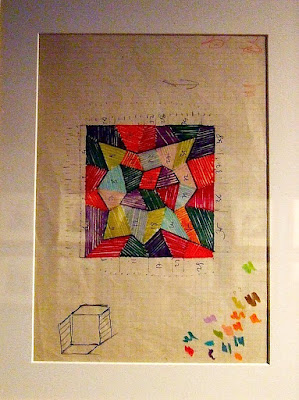WELCOME TO MY BLOG.
I've always had an interest in gardens and in the natural world. I soon realized that these were more than just flowers to me, but people, places, pictures, history, thoughts...
Starting from a detail seen during one of my visits, unexpected worlds come out, sometimes turned to the past, others to the future.
Travel in a Garden invites you to discover them.
Starting from a detail seen during one of my visits, unexpected worlds come out, sometimes turned to the past, others to the future.
Travel in a Garden invites you to discover them.
Tuesday, December 27, 2016
Saturday, December 24, 2016
The Art of Chabana: November and December
Material: Euonymus alatus compactus
Vase: Swedish ceramic vase
Winter is here. It becomes dark earlier every day but it is still not so ruthlessly cold.
Wandering in the silent garden looking for flowers for the tea ceremony is a pleasant and relaxing occupation even if there are no flowers, too late for camelia and too early for narcissus, snowdrops and cyclamen. The group of Helleborus niger, whose snowy flowers are the stars of all florists shops this year, is just a mass of glossy green leaves, but elsewhere in the garden there are promising buds, such as a young shrub of Edgeworthia papyfera or the imposing Chimonanthus praecox.
Tree and shrub branches are the best choice for the chabana in winter. In his book "The Art of Chabana", Henry Mittwer suggests those of Euonymous sieboldianus, Corylus Thunbergii, Pahrabenzoin praecox and Alnus japonica, recommending to choose branches with buds.
Wandering in the silent garden looking for flowers for the tea ceremony is a pleasant and relaxing occupation even if there are no flowers, too late for camelia and too early for narcissus, snowdrops and cyclamen. The group of Helleborus niger, whose snowy flowers are the stars of all florists shops this year, is just a mass of glossy green leaves, but elsewhere in the garden there are promising buds, such as a young shrub of Edgeworthia papyfera or the imposing Chimonanthus praecox.
Tree and shrub branches are the best choice for the chabana in winter. In his book "The Art of Chabana", Henry Mittwer suggests those of Euonymous sieboldianus, Corylus Thunbergii, Pahrabenzoin praecox and Alnus japonica, recommending to choose branches with buds.
For November, I chose three branches of Euonymus alatus compactus, whose unusual winged branches are often forgotten after the intense autumn colours.
The white ceramic vase, which seems a branch itself, is the same for the chabana of December with hazel and Chimonanthus praeocox branches. The branch of Chimonanthus was in bud two weeks ago, its scent is probably considered too strong for chabana, but now it's in full bloom and perfumes the kitchen of winter.
Material: Corylus avelana, Chimonanthus praecox
 Vase: Swedish ceramic vase
Vase: Swedish ceramic vasePhotos:
TravelinaGarden, November and December 2016
Further reading:
Henry Mittwer, The Art of Chabana: Flowers for the Tea Ceremony, Charles E. Tuttle Company Inc., Tokyo, 1974.
Thursday, December 15, 2016
"Marc Chagall, Ottavio Missoni. Dream and Colour." Sesto Calende, Italy.

The exhibition "Marc Chagall, Ottavio Missoni. Dream and Colour." celebrates the work of Ottavio Missoni (1921-2013), fashion designer, and Marc Chagall (1887-1985), painter, at the Archeological Museum in Sesto Calende, a town northwest of Milan on the banks of the Ticino river near Lake Maggiore, not far from Missoni's headquarter in Sumirago.

Colours have an immediate, irresistible appeal in the patchwork tapestries on display. They invite to get closer and discover details, textures and depth. Geometric shapes create fascinating complex structures free from subject and story, pure forms.
Tapestries are surrounded by 24 lithographs of "The Story of the Exodus" and by some of the drawings for the "Bible Series" by Marc Chagall. The Russian born painter began his illustration of the Bible in 1931 and, working at different times, completed his work with 105 black and white drawings in 1956. Instead, colour lithographs of the Exodus are dated 1966. The choice to return after ten years to this religious subject was due, in part, to the possibility of using new printing colour techniques.

Chagall used vivid and intense colours to give shape to his memories, dreams and emotions, to his Russian life and Jewish traditions.
Marc Chagall was one of the artists who inspired Ottavio Missoni. Colour is a distinctive element in their works and their dreams are a gift.
Subscribe to:
Comments (Atom)






